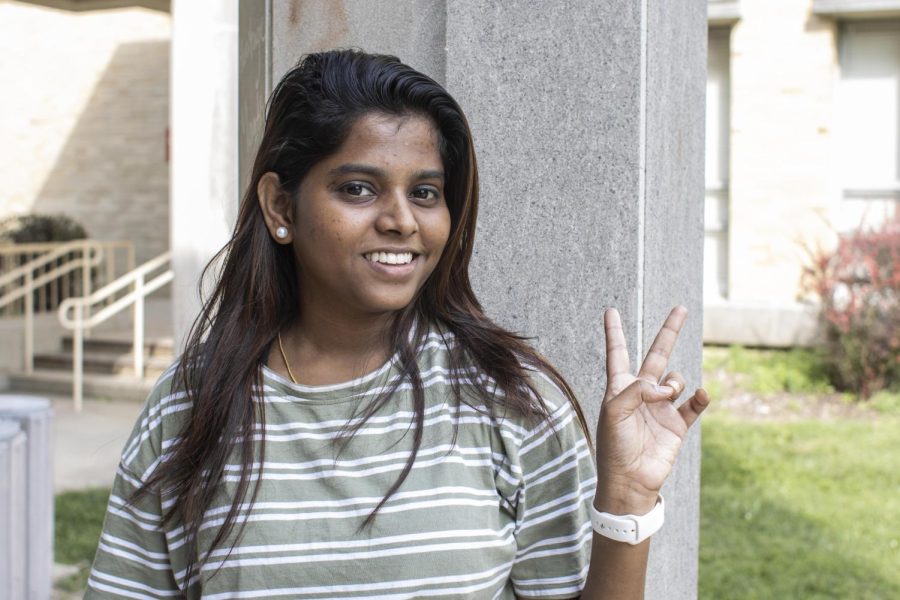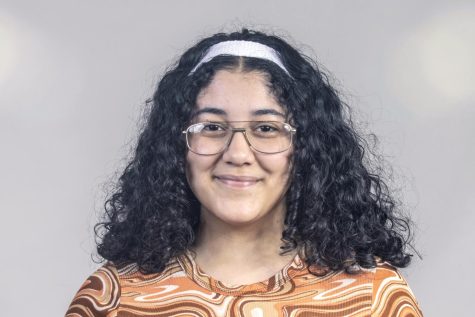Food insecurity affects mental, physical health
Susmitha Murugan, a graduate student stuyding technology, poses for a picture near Lumpkin Hall Friday afternoon.
September 21, 2022
Many college students struggle to cover basic needs, and that often means having to choose between eating a meal or paying a bill.
College students are known for spending their college years surviving off ramen noodles, boxed macaroni and cheese and whatever snacks they can get their hands on. Skipping meals, attending events for free food, going to bed hungry; these things have long been considered part of the classic college experience.
Food insecurity is a lack of access to affordable, nutritious food, something that many college students have experienced.
According to a 2021 nationwide survey conducted by Temple University’s Hope Center for College, Community and Justice, 38 percent of survey respondents at two-year colleges had experienced food insecurity 30 days prior to the survey and 29 percent of students at four-year colleges reported experiencing food insecurity.
Tiffany Walker, a senior psychology major, said she has experienced food insecurity during her time at Eastern, and it has made a negative impact on her day-to-day life.
“Not being able to get food makes me extremely tired, especially on the weekends when you’re trying to get your classwork done, but you’re hungry so you can’t really focus,” Walker said.
M. Colby, a freshman student with an undecided major, said that they have not struggled with food insecurity, but they have food allergies, so they have to be careful with the food they eat.
“I struggle with food allergies, so I have to be even more careful with what I eat here because it’s a cafeteria setting, and I would never eat school cafeteria lunches because of my allergies,” Colby said. “It’s an adjustment having to deal with that here.”
Some Eastern students have friends and classmates who are food insecure.
Faith Worthington, a freshman music education student, said she has seen friends who live off campus struggle with food insecurity.
“I have a couple friends who live off campus, so I do know that, especially because they’re supporting themselves more, they don’t really have a meal plan,” Worthington said. “They’re just buying groceries when they can and relying on their own income.”
Gunnar Olson, a sophomore broadcast journalism student, said that he has seen friends face food insecurity.
Olson said that since they are funding their way through college, they may not have money for food or a meal plan that provides a sufficient number of meals every week.
“I try to help out, give them snacks if they’re hungry, go to meals with them when they do have free time, but some of them are STEM majors, so they are really busy,” Olson said. “And those [majors] are harder, so I can’t imagine doing that much work on an empty stomach.”
Food insecurity can impact many areas of a person’s life: their social lives, their education and their goals.
Hunter Haloway, a sophomore history student, said he has heard of fellow students who spend “certain stretches of time just going off of ramen.”
“If you’re just going off of ramen, you probably won’t do the best in the rest of college,” Haloway said. “And I know that people pay a lot for food and stuff around here.”
Olson said he has seen how food insecurity affects the social lives of fellow Eastern students.
Olson said that sometimes college students may want to “mingle and socialize” and get meals together, but those who cannot afford bigger meal plans may not be able to.
“I do see them impacted,” Olson said. “They feel kind of left out because they couldn’t go to Friday night dinner with someone, and I just feel like it impacts them socially.”
Olson also said that there is lots of research that shows that being food insecure can impact a person’s education.
“If you’re hungry, you can be distracted,” he said. “If distracted, you can’t concentrate in class, which means it’ll be harder for you to learn…”
For some Eastern students, the EIU Campus Food Pantry has been a huge help in combating food insecurity.
“Now with the food pantry and being able to visit it, I think that helps a lot,” Walker said.
Some Eastern students said that they wish the university would better spread information about resources for students struggling with food insecurity.
Haloway said he thinks the university is doing a lot to help combat food insecurity on campus, but enough of it is not being shared with students.
“I think it would be nice for it to be more than just a poster,” he said. “Maybe if somebody’s living in the dorms, have their RA, when they have a meeting or whatever, go up to them and tell them ‘Hey, these are places if you ever have trouble getting food to get food.’”
Olson said he thinks it would help if the university provided free food and snacks at more locations around campus, not just at the food pantry.
“Maybe generally more food pantry distributions around the campus, not just at one place,” he said. “Maybe a little snack table somewhere on one of the quads.”
Kyara Morales-Rodriguez can be reached at 581-2812 or at [email protected].





















































